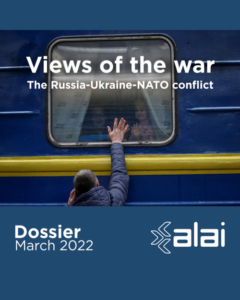 In spite of their hatefulness and virulence, wars continue to be a fatally frequent occurrence. There have been very few years since the dawn of capitalist modernity in which there have been no declared or undeclared armed conflicts between states, nations, regions or ethnic and religious communities. As in World War I and World War II, and following Russia’s invasion of Ukraine, Europe is once again the theater of large-scale military operations that threaten to go global.
In spite of their hatefulness and virulence, wars continue to be a fatally frequent occurrence. There have been very few years since the dawn of capitalist modernity in which there have been no declared or undeclared armed conflicts between states, nations, regions or ethnic and religious communities. As in World War I and World War II, and following Russia’s invasion of Ukraine, Europe is once again the theater of large-scale military operations that threaten to go global.
However, it is not only Russia (the invader) and Ukraine (the invaded) that are the actors in this drama: the incessant expansion of NATO, since the dissolution of the Soviet Bloc – and of its military counterpart, the Warsaw Pact -, makes it an element of capital importance for thinking about the triggers of war and the possibilities of achieving peace in the Euro-Asian macro-space.
The strengthening of the “unlimited” alliance between Russia and China is also important, as is the closing of the ranks of a Euro-Western bloc that had just gone through its worst historical moment amidst Brexit, Donald Trump’s presidency and Germany’s trade agreements with Russia. One thing is certain: despite the selective and belated pacifism of the great powers and the media corporations that consent to war against “enemy” populations and “regimes”, not everyone loses in this conflict: certainly not the arms manufacturers and exporters, nor the contractor and mercenary companies.
A new multipolar world is emerging, but there is nothing to suggest that it will be a fairer and less bellicose world: the very idea of poles and zones of influence (and even exclusion) of the great powers can turn Ukraine, Syria or Libya, (today – but tomorrow any country in our region) into veritable “sacrifice zones“. Sacrifice like that of the millions of refugees and population displaced by war, paramilitarism and violence from Ukraine to Yemen, from Colombia to Palestine, from Syria to Somalia.
For these same reasons, the war does not and could not go unheeded in Latin America and the Caribbean. In addition to the increase in international prices of certain raw materials (food and hydrocarbons), there are forced geopolitical alignments, ranging from support for Russia or the United States (with NATO also having a presence in our region), through a wide range of stances of equidistance and neutralism. What is most worrying is that the region has shown itself once again, as it did in the face of the Covid-19 pandemic, incapable of deliberating and acting as a bloc. None of the relative benefits of multilateralism can be taken advantage of by Latin America while it lacks a collective vision.
In the midst of the escalation of war and with scarce signs of its short-term ending, ALAI presents its Dossier “Views of the war: readings of the Russia-Ukraine-NATO conflict”, corresponding to the month of March 2022. We start from a strong ethical condemnation of the war to arrive at a detailed analysis of the conflict, its trends, causes and protagonists (moreover, in a context of massive and global censorship). The dossier contains a series of articles of analysis and opinion published on the ALAI website in Spanish, English and/or Portuguese, which have been written from different territories such as Argentina, Brazil, Chile, Ecuador, Mexico, Peru, Venezuela, United States, Russia, India, Portugal, Australia and England.

